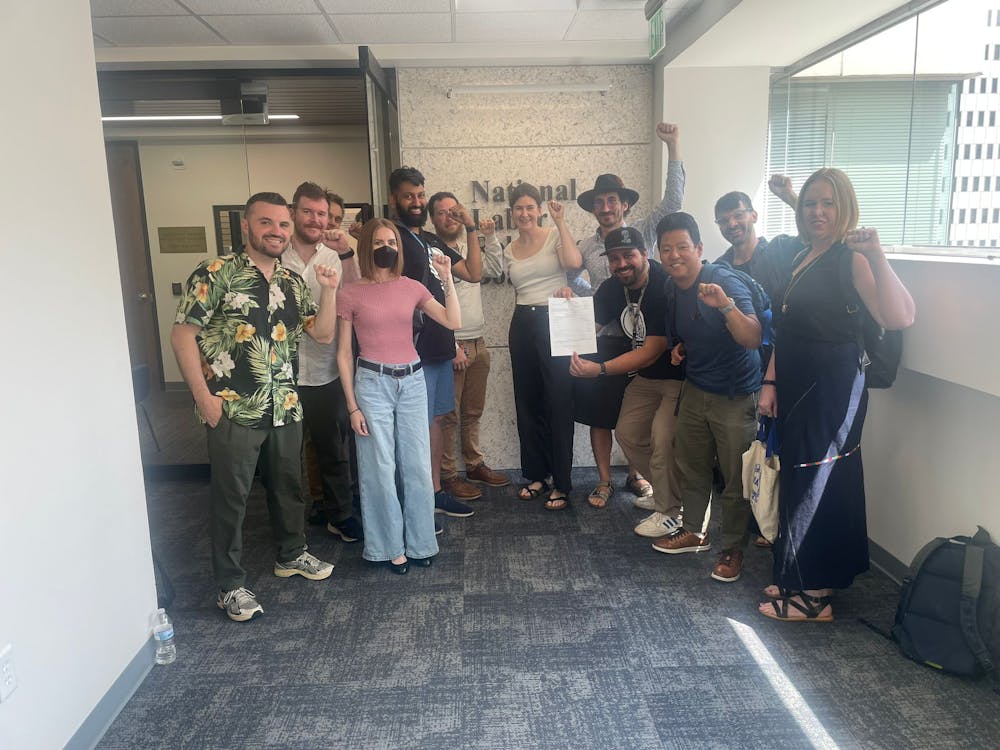Two years after her release of the dark, meandering musical work Once I Was an Eagle, British singer-songwriter Laura Marling has recently released her fifth album, Short Movie. Largely inspired by Marling’s stay in Los Angeles, where she lived a life away from her music career for three years, Short Movie is a strange, often puzzling album. This work at once displays Marling’s musical genius and growing command over her instrument, as well as her failures as a first-time producer.
While Marling’s past albums were produced by musician Ethan Johns, who also provided the instrumentation for Once I Was an Eagle, Marling chose to produce this new album herself, with the assistance of two studio technicians.
In this new role as both musician and producer, Marling chooses to add certain elements — such as the use of reverb, layered voice and dissonant noises — to create an effect that is not present on her previous albums. While these effects are interesting, they do little to improve the tracks themselves or the sentiment behind them.
Also, without Johns’s deep understanding of instrumentation, many of the songs feel messy and chaotic, with a distinct lack of balance between different musicians. This is certainly the case on tracks like “Short Movie,” in which the drumming feels disconnected from the rhythm of the other instruments. However, this chaos can arguably be interpreted as being related to the environment that surrounded Marling when she lived in Los Angeles.
Another interesting choice made for this album is the use of a lead electric guitar. Though an electric guitar had been used in past albums, Short Movie is Marling’s major electric debut. Still, the electric guitar tracks like “False Hope” and “Gurdjieff’s Daughter” provide a fresh and fitting accompaniment to her vocals. In fact, the use of electric is generally underwhelming and does not entirely deviate from Marling’s original guitar style.
Marling also exercised greater control over the track list for the album. In this case, it’s disappointing that she chose to include light, seemingly insignificant songs like “Divine” and “Don’t Let Me Bring You Down” over more poignant tracks like the pensive “Narrow Road” or the spiritual “David,” which was only included as a bonus track.
Another issue throughout is the presence of songs that are overly long and repetitive like “Warrior,” “I Feel Your Love” and “Howl.” Marling has been known to write long, complex songs, with many on her previous albums closer to the six minute mark. However, compared to “Night After Night” from her third album or the haunting “Little Love Caster” from her fourth album, these tracks drag along with no clear motivation.
While many songs like “Warrior” remain true to Marling’s darker tendencies — complete with snarling and malicious laughter — many find Marling struggling to bring a bit of light to her music. A prime example of this is on “Divine,” an upbeat love song that is more akin to the breezy style of Jason Mraz than typical Laura Marling. With this song, Marling is much more direct in her communications with her love interest.
“I’m yours and you’re mine/ It’s fine,” she sings.
One of the greatest disappointments on the album is “Strange,” a song that has slowly devolved from when she first performed it live. While it began as a boisterous, snarling rant with Marling’s guitar skills on show, the studio version of the song is much more tame and quiet, with the drums almost completely drowning out the guitar. Also, within the context of the album’s narrative of displacement and solitude in a new country, the song’s story about a family man and his mistress seems out of place.
Highlights on the album include “Easy,” a clean, catchy song of longing for the ease of young, innocent love, as well as “Walk Alone,” a moving song where Marling’s lush vocals are perfect for the story of her jarring realization that she is unable to live without the love of another.
The album’s namesake, “Short Movie,” is another one of the better tracks on the album. The song continuously builds until the very end, when Marling is essentially shouting the line: “It’s a short f**king movie, man” over and over again, a call for the recognition of the brevity of life and the insignificance of our daily concerns.
While Marling is often regarded for her unique, intensely visual lyricism, her guitar skills are particularly highlighted on this album. Songs like “Strange” display her incredible sense of rhythm, while “Easy,” “Worship Me” and “Walk Alone” show her intricate picking, which has undoubtedly improved since her first album. Additionally, while known for her husky, idiosyncratic voice, Marling relies more on falsetto and a whisper head-voice for many songs. This causes a loss of impact on tracks like “How Can I” and “Easy” in which a deeper vibrato would have created a greater sense of emotional depth.
This album will surely divide fans of Marling’s music, which has greatly evolved overtime. Fans of Marling’s darker, more obscure albums like Once I Was an Eagle or A Creature I Don’t Know will most likely be disappointed by a majority of this lighter, wispier album. Those who connected with the innocence and directness of Marling’s first album Alas I Cannot Swim will be pleased with the more straightforward themes and lyrics.
Despite its shortcomings in instrumentation and depth of narrative, Short Movie is yet another album that showcases Marling’s incredible abilities as a musician and is likely to receive praise from both critics and fans.




